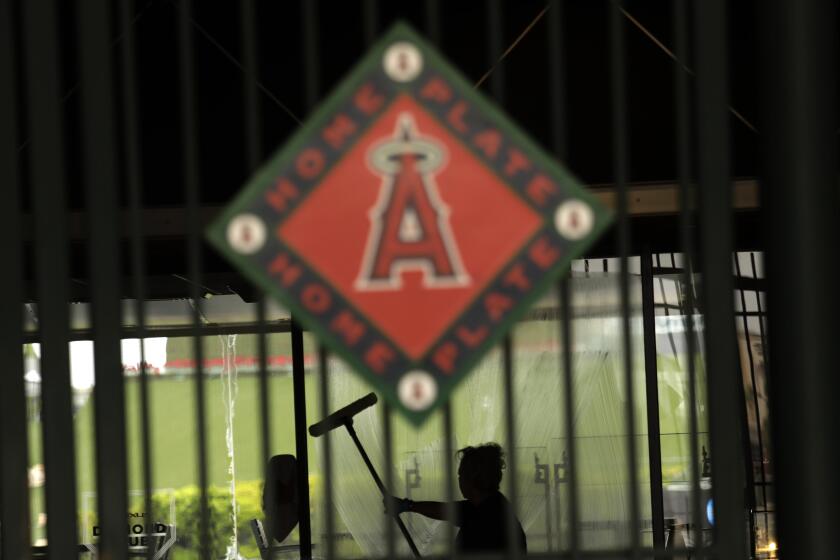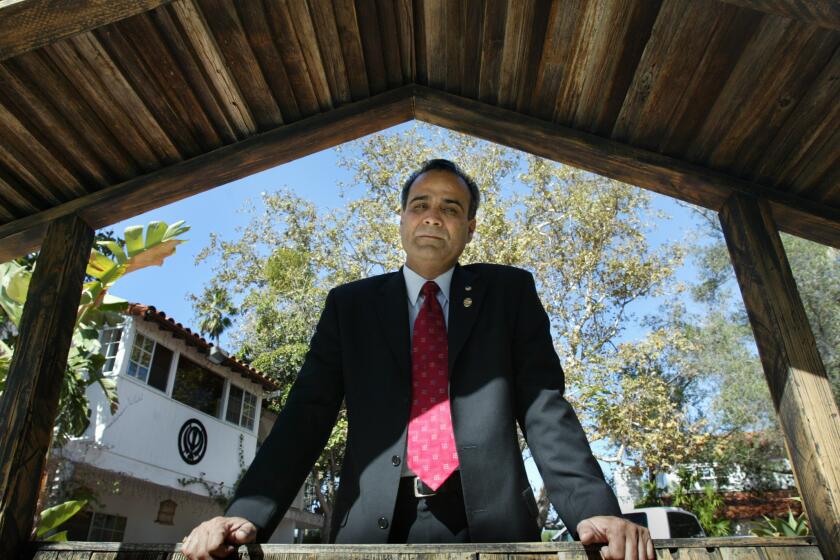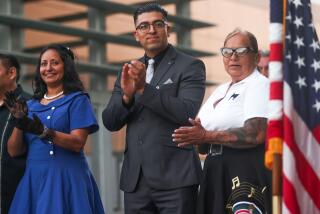How Disney, a new mayor and a secret ‘cabal’ gained power over Anaheim

- Share via
Inside the 3,000-square-foot suite on the top floor of the Disneyland Hotel’s Fantasy Tower, Harry Sidhu beamed as he surveyed the small group of Anaheim business leaders, consultants and politicians celebrating their return to power.
Results from a bruising election filled the big-screen television behind the future mayor that night as supporters sipped wine and laughed amid red, white and blue balloons and small American flags.
“Anaheim’s future is going to be bright going forward from here,” Sidhu told the group in a video of the event reviewed by The Times. “We are open for business!”
Cheers filled the Blue Sky Suite, decorated with Midcentury Modern furniture and vintage renderings of Tomorrowland. Optimism flowed through impromptu speeches by Sidhu and two victorious councilmen like the flood of big-business cash that drove their campaigns.
Left unspoken amid the applause, however, was that this November 2018 night also heralded the return of a small, secretive group of individuals who pulled the strings at Anaheim City Hall. They would steer policy, receive contracts from the city and script remarks by the mayor. One member called it a “cabal” in a conversation intercepted by the FBI.
Hundreds of pages of campaign finance records, city documents, emails and interviews show how deep-pocketed corporate interests — Disneyland Resort chief among them — regained influence over Orange County’s most populous city, where a sprawling federal political corruption investigation has thrown the home of the self-described “Happiest Place on Earth” into turmoil.
The wide-ranging investigation includes the sale of Angel Stadium and allegations of bribery involving Anaheim’s mayor.
Sidhu resigned as mayor last month after being accused in a search warrant affidavit of a slew of misdeeds in connection with a now-dead deal for the city to sell Angel Stadium. Todd Ament, the former Anaheim Chamber of Commerce head who secretly recorded meetings with Sidhu at the direction of the FBI, agreed to plead guilty to four felonies as part of a deal with prosecutors. He was a cabal ringleader, the FBI alleged in a different affidavit, along with political consultant Jeff Flint, who has represented Disneyland Resort and the owner of the Angels. The FBI described Carrie Nocella, Disneyland Resort’s director of external affairs, as one of the group’s other ringleaders “to some extent.”
Neither the company nor Nocella has been accused of wrongdoing by federal authorities.
All of them were at the suite on election night. As Sidhu finished his remarks — most read from a sheet of paper held close to his face — he pledged “red carpet treatment” for anyone doing business in Anaheim.
“The last few years you have seen the anti-big corporation, you have seen the anti-teams,” the future mayor told the supporters. “Guess what? It’s about time as a mayor and a new council we’re all going to get together … to make Anaheim shine again.”
◆◆◆
Two years before the Disneyland Hotel celebration, the cabal’s influence had faded in the city of 350,000, where high-powered business interests had long held sway.
Though Tom Tait had been elected mayor in 2010 with the strong backing of Disneyland Resort and its allies, he surprised many when he began fighting against corporate subsidies. In 2015, he opposed a vote by the council to exempt Disneyland Resort from admissions taxes for 45 years. By the next year, Tait had built a majority on the council to oppose corporate tax breaks.
Meanwhile, the resort’s campaign spending mushroomed from several thousand dollars in 2006. A confrontation over affordable housing led to the formation of the Disney-backed advocacy group Support Our Anaheim Resort Area, or SOAR. By 2016, the resort was pouring more than $1 million into City Council elections, campaign finance records show.
With Tait unable to run in 2018 because of term limits, Disneyland Resort and its allies invested more than $2 million in the pivotal campaign to elect Sidhu and secure a council majority — in addition to $300,000 from the resort opposing a ballot measure to increase the minimum wage at hospitality companies that received city subsidies.

Subscribers get exclusive access to this story
We’re offering L.A. Times subscribers special access to our best journalism. Thank you for your support.
Explore more Subscriber Exclusive content.
“It felt like there was an arrangement between these very powerful vested interests,” said Ashleigh Aitken, an attorney and former federal prosecutor who lost the race for mayor, a nonpartisan position, by fewer than 500 votes. “When the [political action committee] money started pouring in, it was relentless.”
Disney gave $1.2 million to the PAC run by SOAR in 2018, accounting for all but about $6,800 of the money the group received that year. The PAC, in turn, spent almost $1.1 million supporting three council candidates: Jordan Brandman and Trevor O’Neil, who won their races, and Mitch Caldwell, who lost.
“We believe it is important to Anaheim’s future to support organizations and candidates who support business growth and the continued development of the Resort District, which helps to create jobs and ensures a strong local economy and vibrant community,” Disneyland Resort said in a statement.
The Anaheim Chamber of Commerce PAC — which received $49,000 from Disney — put $237,000 behind Sidhu. He benefited from more than $630,000 in independent expenditures, while Aitken faced opposition bankrolled in large part by hotel developers.
The Anaheim/Orange County Hotel & Lodging Assn. PAC invested more than $107,000 targeting Aitken through advertisements and mailers, while the Lincoln Club of Orange County State PAC chipped in nearly $97,000 to go after her. A mailer paid for by the group pictured an open pair of handcuffs and claimed Aitken backed a judge who had reduced the prison sentence of a child molester. The Lodging Assn., which started a website called “Out of Touch Ashleigh Aitken,” echoed the allegation in social media advertisements. It wasn’t true.
Sidhu’s campaign pushed another advertisement blasting Aitken’s support of needle exchange programs: “Stop needles … stop Aitken.”
It all led to Sidhu’s victorious speech in the Blue Sky Suite. He was going to become the first person of color to become mayor in a town where the Ku Klux Klan briefly took control of the City Council in 1924.
After emigrating from India to the U.S. in 1974 — Sidhu liked to note that he arrived with $6 in his pocket — he fashioned a uniquely American story. He worked as a janitor, earned an engineering degree and built a small-business empire of fast-food restaurants that led to his buying a 3.5-acre estate in Anaheim Hills and a 41-foot yacht called the Taj Mahal.
“I’m going to make sure the American dream continues to be in Anaheim,” he told the supporters.
SOAR Executive Director Jill Kanzler said the group’s nonprofit arm, not the PAC, hosted the event in a ballroom and the suite. She declined to say how much it cost.
Disneyland Resort executive Carrie Nocella is one of the unnamed “ringleaders” of a “cabal” that an FBI affidavit says runs Anaheim, according to a source familiar with the FBI inquiry. She is not accused of wrongdoing.
The two victorious councilmen addressed the group in the suite. “Tom Tait has had his last hurrah,” O’Neil said to loud cheers.
Brandman looked around the room for someone in particular.
“Carrie, where are you?” he asked supporters, searching for Nocella, the Disney power broker.
Nocella ducked behind a lobbyist who headed the lodging association and its PAC.
“Thank you for hosting us today,” Brandman told Nocella.
◆◆◆
During the suite speech, the new mayor called Major League Baseball’s Angels one of Anaheim’s pillars — along with Disneyland Resort and the National Hockey League’s Ducks — and pledged to strengthen them.
“If you take any of the pillars away, where do you think Anaheim will be?” Sidhu said. “That’s exactly what [opponents] are trying to do, destroy the pillars of Anaheim. In my time, for the next four or eight years, it will not happen.”
The difference in the new regime became apparent to then-City Manager Chris Zapata shortly after the election. The new mayor handed him a one-page timeline for completing negotiations to sell Angel Stadium and the surrounding parking lots to a company controlled by Angels owner Arte Moreno.
The timeline, Zapata told The Times, called for the sale to be completed in six months. The city manager was stunned, believing it to be impossibly fast for a deal worth $320 million that had the potential to reshape a significant part of the city.
“When he handed it to me, I told him this ain’t going to work,” Zapata said.
A week or two later, Zapata saw Ament, the head of the Chamber of Commerce. “You don’t like my schedule?” Ament blurted out.
The Anaheim city council will meet Tuesday to try to figure out next steps in the deal to sell Angel Stadium land to Angels owner Arte Moreno.
“At that point I said, ‘That’s not the mayor’s schedule, it’s your schedule,’” Zapata said.
In January 2019, the council voted on a change to the Angel Stadium lease. At the time, the city issued a news release presenting the change as “a one-year stadium lease extension.” But the agreement approved by the council actually granted Moreno the right to keep his team at the stadium for as long as an additional 19 years without the Angels giving up anything in return.
During the State of the City luncheon speech in March 2019, Sidhu touted his work with the Angels: “I reached out to the team’s owner … to see what we could do to keep the team here, unlock the potential of the land around the stadium and craft a plan that benefits our city and our residents.”
He praised Disneyland Resort. He praised the Chamber of Commerce. He praised investment by hotel companies.
“We aim for nothing less than a new Golden Age for Anaheim,” Sidhu told the crowd.
A PDF of the speech was uploaded to the city of Anaheim’s website. The metadata for the file listed the author: Political consultant Jeff Flint. He did not respond to requests for comment.
In April 2019, the City Council approved giving $250,000 to a newly formed nonprofit called Anaheim First. The group — described as a partnership among the Chamber of Commerce, Visit Anaheim and the Anaheim Community Foundation — was part of an initiative Sidhu touted in the speech to invest $250 million in the city’s neighborhoods over the next decade.
Metadata from the PDF files for the staff report supporting the expenditure, and the council resolution showed the same author for each one: Ament’s executive assistant at the chamber. Though Anaheim First’s website described it as a “grass-roots” organization, the initial IRS filing in 2019 listed it at the same address as the chamber and Ament as the chief executive.
Anaheim is a working-class city whose residents have more pressing concerns than civics, leaving room for unscrupulous officials to operate, Arellano writes.
At Sidhu’s request, the Chamber of Commerce received a $425,000 contract in June 2019 for the city to be the lead sponsor of events like the State of the City luncheon and placing full-page advertisements in the chamber’s magazine as part of a marketing program.
The money continued flowing in March 2020 when the council approved Sidhu’s plan to direct $6.5 million in federal coronavirus relief funds to Visit Anaheim to “support the relaunch of tourism marketing.” Disneyland Resort, however, didn’t reopen until April 2021.
At Sidhu’s recommendation, the council in August 2020 greenlighted giving an additional $500,000 to the Chamber of Commerce for a “shop local” initiative.
The Angel Stadium deal continued to move forward. In July 2019, for example, the City Council approved Sidhu’s proposal to appoint himself as the group’s sole negotiator.
According to the affidavit in support of the Sidhu search warrant by FBI special agent Brian Adkins, the agency intercepted communications by Ament, Flint, several City Council members and the mayor that showed the “cabal” wielding power over the council.
“As a result, I believe such influence may have been used to sway the City Council vote in favor of his appointment — and only his appointment — to the negotiating team,” Adkins wrote.
The affidavit also accused Sidhu of providing confidential information about the stadium sale to the Angels on at least two occasions. The team hasn’t been accused of any wrongdoing.
Even with the mayor negotiating, the Chamber of Commerce kept pushing. Facebook records show that advertisements on the platform in 2019 for a group called Keep the Angels — touted as a grass-roots effort to retain the team in Anaheim — were paid for by the chamber. An emailed “Call to Action” from the chamber in May 2020 before a City Council meeting urged recipients to send a form letter to elected officials: “We need your help to make sure the City Council hears your sentiment to Keep the Angels in Anaheim.”
But Ament was secretly recording conversations for the FBI since at least October 2021. During one of the sessions, according to the search warrant affidavit, Sidhu suggested he would push the Angels for a million-dollar campaign contribution when the stadium deal concluded. Sidhu hasn’t been charged and, through his attorney, has denied any misconduct.
Sidhu resigned last month. Flint went on leave from his companies. Ament took the plea bargain.
The jubilant gathering in the Disneyland Hotel suite more than 3½ years ago signaled that big business had reclaimed power in Anaheim.
But no one in the Blue Sky Suite — an homage to Walt Disney’s optimistic view of the future — could have known what was coming: In less than a year, the FBI would be investigating the cabal.
More to Read
Sign up for Essential California
The most important California stories and recommendations in your inbox every morning.
You may occasionally receive promotional content from the Los Angeles Times.

















